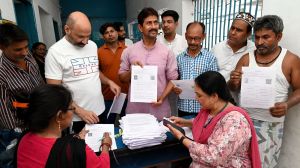The Day INDIA cracked
The partition of India in 1947 was a cataclysmic event from which the country has not yet recovered. Millions were uprooted and killed in a ...

The partition of India in 1947 was a cataclysmic event from which the country has not yet recovered. Millions were uprooted and killed in a frenzy of madness that gripped the country. It is a scar that divides our history in two — everything was before or after Partition. It haunts the imagination of India, and no two persons can — or will — have the same view of it.
The genesis of Partition, its necessity, inevitability and avoidability, and the manner in which it took place — these have been areas for historical probings, as well as recriminations and What Ifs. Historians and survivors look for a suitable scapegoat — Nehru, Jinnah, Mountbatten, even Gandhi. Even the most disinterested and dispassionate person will be overwhelmed by the passions and emotions that Partition evokes.
It is therefore interesting to have in hand a book originally published in 1948 as Punjab Uprooted by a young man, which has been described by the eminent historian, Ian Talbot, as a classic. That young man was B.R. Nanda, later to be founder-director of the Nehru Memorial, and the doyen of Indian historians. The original text — an eyewitness account of Partition in the Punjab — has been supplemented by a new introduction, which offers an account of the events that led up to the fateful day. It is amazing to see that half a century ago, Nanda wrote with the same passionate restraint and deep and equal commitment to scholarship and humanity that are the hallmark of his historical work.
Nanda the historian of today refuses to see any single incident or episode as being the cause of Partition. He sees it as the culmination of a historical process, the alienation of Muslims, aided and abetted by British officialdom, and a nationalist leadership unable to fully come to grip with it. It was also the result of the fact that in two areas of the country Muslims were dominant numerically, leveraging this demographic statistic for political power. The convergence of all these diverse factors led to a holocaust few expected.
|
|
|
WITNESS TO PARTITION: A MEMOIR
By B R Nanda Rupa Price: Rs 250 |
|
|
Could Partition have been avoided? Nanda briefly delineates the progressive concessions that the Congress made to the Muslim League in a desperate bid to salvage unity, all failing before the march of Jinnah to his goal. He tears into the Two Nation Theory, showing how unhistorical it was, the exact opposite of the reality on the ground, in which Muslims and non-Muslims lived, worked and died together.
Nanda the witness begins with the feelings of satisfaction he felt in 1946, that the Punjab was free from the horrors visited upon Bengal and Bihar. He chronicles the steady march towards anarchy, and the breakdown and ultimate disintegration of society in the Punjab. The flow of refugees, the killings, the attempts at rehabilitation — all these are described in prose free of rancor; the anger being directed, in a very fitting Gandhian manner, at the act, and not the doer. The witness may have been young, but not immature and impetuous.
But also remember, Nanda the witness and the historian are not two separate persons. They are one and the same. The witness gave birth to the historian, and the historian is, even today, carrying forward the witness’s mission to understand this bitter business of Partition. What the witness wrote in 1948 is still the motivating force for the historian today: ‘‘A person, with a sense of history, when faced with a national crisis, is less concerned with naming the criminals on the spot than with the underlying causes of the crisis and the short-term and long-term measures for its cure.’’



- 01
- 02
- 03
- 04
- 05




























